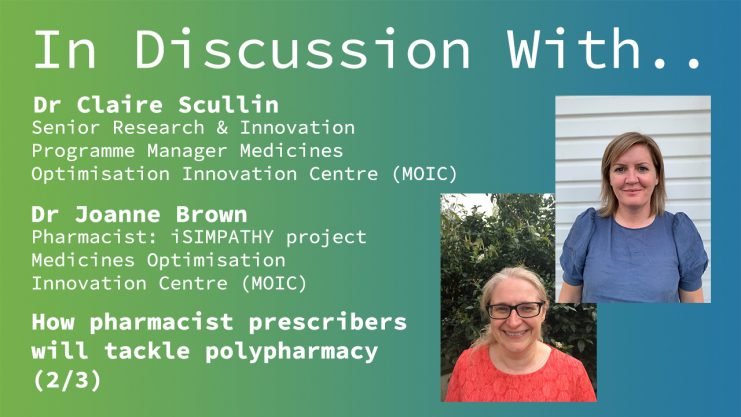Advertisment
How pharmacist prescribers will tackle polypharmacy

Interview and article by Christine Clark.
Drs Claire Scullin and Joanne Brown describes how prescribing pharmacists will carry out in-depth medication reviews for hospital inpatients and make any changes needed to prescriptions as part of the iSIMPATHY project to tackle the problems of polypharmacy.
“Ultimately, what we are aiming to do is to deliver 15,000 reviews over the next two years, by 10.5 pharmacists who will be trained in the iSIMPATHY method”. Of these 6000 interviews will be carried out in Scotland and 4500 each in The Republic of Ireland and Northern Ireland. “We are unique in Northern Ireland because we are delivering our medicines reviews in the hospital setting, in secondary care, while Scotland and the Republic [of Ireland] are delivering the reviews in primary care”, noted Dr Scullin.
The Medicines Optimisation and Innovation Centre (MOIC) is involved because for the past 20 years it has been involved in investigating the role of the clinical pharmacist in improving patient outcomes. Evidence of this can be seen in the many publications from the MOIC over that period. “We see [iSIMPATHY] as an extension of that current medicines’ optimisation service improvement area that we have been working on for a long time”, says Dr Scullin. Current services tend to focus on medicines’ optimisation at the time of admission and discharge. “Sometimes that bit in the middle can lose out a bit”, she adds. The iSIMPATHY project is expected to deliver real benefits at this stage as project pharmacists will be delivering intensive medicines’ reviews to hospital inpatients.
Dr Brown explains what this will mean in practice for the project pharmacists. “We are all prescribers so we are able to action all of our recommendations ourselves – but obviously in close conjunction with our medical and other pharmacy staff”, she says. The Scottish polypharmacy guidance – 7 Steps to appropriate polypharmacy is used as a framework for the medication reviews. The first step involves establishing what matters to the patient. The interview continues by determining which treatments are essential and which are unnecessary. Next, treatment is assessed to see if adjustments are needed to achieve therapeutic goals. For example, this could be asking if a painkiller is working or checking to see if antidiabetic treatment is reducing haemoglobin A1C (HbA1C), explains Dr Brown. The interview continues with consideration of actual or potential adverse drug reactions or side effects and then cost-effectiveness. “Lastly we are looking at the patient’s willingness and ability to take their medicines as prescribed. There’s no point in prescribing a wonderful medicine if the patient does not believe it will work and will not take it. It’s no coincidence that the patient is the first step and the last step – they are the centre of the decision-making about their medicines and their health”, she says.
Information on non-pharmacological support for patients is also provided, including self-care advice, referral to other services and ‘signposting’ to help patients take better care of themselves and take ownership of their health.
Pharmacists normally undertake medication reviews as part of their routine work, for example, medicines’ reconciliation is always carried out at the time of admission. However, these in-depth reviews take a lot of time. “These interviews take longer because we look at the patient holistically and take into account the patient’s own health goals and other factors that may not have been documented previously”, says Dr Brown.
The three-year iSIMPATHY project is taking place in Norther Ireland, Ireland and Scotland led by the Scottish Government and is funded by the EU INTERREG VA program.

Read more in the iSIMPATHY project here.
Read and watch the full series on our website or on YouTube.





